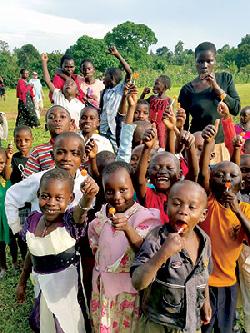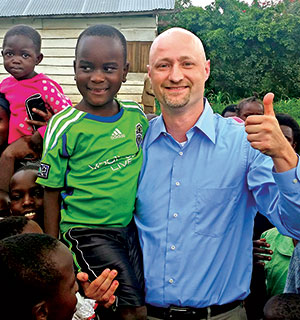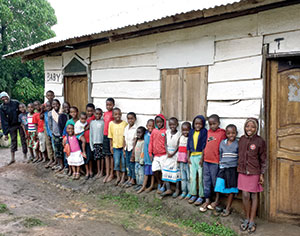 |
“Sweet! Sweet!” is the refrain in Uganda when a bag of candy is nearby.
|
|
|
|
|
Parting Shots from The Current: Tales from Uganda
12/29/2014 2:53:00 PM
In the absence of answers, pursuing a fuller story
By Josh Johnson
Current Staff Column
Fifteen thousand five hundred fifty-seven.
That's the number of words I pecked into my iPad while journaling a 13-day visit to Uganda this November.
Why is it, then, when people ask me about the trip, I can't find the words to answer their questions?
"What did you learn, Josh?"
"What were your key takeaways?"
"What is the best strategy to assist the people you were visiting?"
I'm at a loss when asked questions like this. To be sure, my mind is actively swimming in search of the somewhat muddy "moral to this story." As for strategies for helping the Third World, I have a couple partially formed opinions on the matter and several others that were struck down by the novel idea of actually going there.
At times, I admit I'm frustrated at still being in a bit of a fog about the trip, some four weeks now from when I returned. The American in me is freaking out: "Capture the data! Form a hypothesis! Take action! Achieve results!"
These are all fine things; I'm just not there yet. And the tiny piece of African I absorbed is telling me that's OK.
One of my favorite aspects of African culture is its rich tradition of storytelling. You can learn a lot from stories. In America, we like our lessons to come complete with three-point outlines and action steps, but learning from stories is more introspective and therefore more intuitive, which is also to say it takes longer.
I have a hunch many of life's most important lessons are the result of marinating in the complexities of personal growth as opposed to injecting them straight into the bloodstream.
So what did I learn? Still chewing on it. But here are the words I have for now -in story form, of course. They are stories about kids.

Derek's Sounders jersey stuck out to Current Publisher Josh Johnson during a November trip to Uganda.
|
Better than rave green
The first kids to truly catch my eye in Uganda were Derek and Dick. Rave green jerseys will do that.
The twin boys were wearing Seattle Sounders soccer kits. I could hardly believe my eyes. I'm a massive Sounders fan. My only other trip this fall was a quick there-and-back to Seattle to catch a game against Real Salt Lake at CenturyLink.
We were visiting a church, and there were kids everywhere. But only two were sporting the rave green, and I tracked them down.
"Seattle Sounders, Seattle Sounders," I enthused, pointing to their jerseys and flashing a thumbs up.
They seemed to like that I took a special interest in them, though they didn't seem to have a clue why. Their smiles were unique to them and at the same time so much like those on the kids around them - megawatt African smiles. Derek was 100 percent boy; he was happy to cheese for the camera and then zipped away to play.
The pastor we were visiting told me the twins were orphans who lived with a couple from the church. The couple looks after 10 kids in all, five their own and five orphans - a dozen Ugandans in total doing life together in a tiny hut.
The Sounders jerseys were the kids' Sunday best, one-time gifts from a couple in Seattle who at one time took an interest in the boys, pledged regular support and then faded away.
I saw Derek and Dick later that week with the three other orphans they live with. I didn't recognize them at first. Derek was wearing a light purple tank top and Dick was wearing what appeared to be a blue blouse with a glittery silver flower on the front. By that point, I had realized it was not at all uncommon for Ugandan kids to wear opposite-gender clothing - the closest thing that fits.
Though dressed a far cry from those overpriced Sounders jerseys, these were the same kids. Laughing, playing - the same kids.
I said I didn't recognize them at first. That was before I saw Derek flash his one-of-a-kind smile. And to think I had been looking for a certain hue of green.
An ‘Angel' leads worship
Angel was abandoned by the river as a baby.
Her mother apparently didn't want the guilt of throwing her daughter into the water to drown, although that end result was clearly her intention. She placed the child right on the edge of the bank with her doll just out of reach. If she were to crawl for the doll, she would roll down the river bank and be washed away.
But Angel was being watched over. She was located by a passerby and brought to a pastor in town, who placed her with a widow from the church named Usta (pronounced like "I ‘use-ta' like New Kids On the Block, but I'd rather not talk about it"). Usta breastfed the girl and raised her as her own - along with the 14 other children that have been placed with her, none of them biological.
The pastor talks about Usta as a tireless worker with a huge heart. She lives with all the children in a home the size of an American living room four miles away from the church. They walk to church and back every week. Despite the fact there is no money to send these orphans to school - and no room left at the 60-child orphan school the church operates on its campus - she is teaching them the Bible.
"Angel is amazing. She knows more Bible verses than me," the pastor marvels.
On the Sunday I meet her, Angel is leading a children's choir as the soloist with the microphone. The other kids are barefoot, but she has purple and pink striped stockings pulled up to her knees. Angel leads the choreography and belts out the lyrics with the polish of a pro.
"I've got my mind made up and I won't turn back because I want to see my Jesus someday."
The children sing the English lyrics over and over, as the congregation - 85 percent of them unemployed, most missing loved ones from disease, many uncertain of their next meal - claps and shouts along.
I look up from the iPhone screen I'm shooting video from and realize everyone but the three white Americans are dancing along with the choir.
I can't comprehend what is happening, but I never want to forget it.

A few of the orphans visited by a small team from Valley Real Life Church in SpoKane Valley smile for a photo in Fort Portal, Uganda.
|
Ugandan whiplash
The Americans are late. It's the second-to-last day of our trip, and we are standing up orphans. I'm feeling more than a little bit guilty.
The plan had seemed like a good one. We decided we wanted to interview some of the orphans in the Fort Portal church we were visiting. The idea was basic and far from fleshed out. Gather stories. Hopefully share stories with friends back home. Maybe some will feel inspired to support the work this Ugandan church is doing among the poorest in a poor community.
But the window we chose was on the back end of the one sightseeing day on our itinerary. We left at 4 a.m. to visit Queen Elizabeth National Park, a couple hours away in good driving conditions.
I will digress long enough to say that the trip was an incredible whirlwind adventure. We saw elephants, hippos, flamingoes, monkeys, cranes, hyena, water buffalo, warthogs and a pride of eight lions - all in their natural habitats in the wild. We almost got stuck in mud on a terrible road next to an elephant our driver feared was going to charge. We ate lunch at one of the more beautiful settings the good Lord painted in this world, at a resort on a peninsula jutting out into Lake Edward. I ran into two guys from Seattle who introduced themselves to me because I was wearing a Gonzaga shirt. Then there was the friendly British woman enjoying tea on holiday and an Austrian photographer who would later email us incredible snapshots of the lions we witnessed together in the wild … pictures he took through what appeared to be a lens so big it might be able to capture the rings of Saturn … while he sat perched like royalty through an opening atop a sleek off-road vehicle … that was piloted by a smartly dressed gui
de who let us borrow his binoculars when we parked our van alongside.
I could write volumes about these few hours at the national park; it's just that what would happen later in the day left me with such mental and emotional whiplash, I don't have it in me.
The drive home turned rainy, and by the time we showed up we were 45 minutes behind schedule. Would anyone still be there when we showed up? As we turned into the muddy drive leading to the church, my heart sank - and not because the place was vacated, but quite the opposite.
The pastor had spread the word that we would love to visit with any of the church's orphans who happened to be in the neighborhood and wanted to stop by - no promises of support. He said we were just gathering stories. Even still, over the next two hours and continuing for another couple hours the next day, we visited with 404 of the 511 orphans the church keeps tabs on, patiently playing in the rainy fields for their turn to share their story. To improve efficiency, we separated them into households, and there were still 98 different groups.
The eighth group we interviewed was one of the smallest ones - 9-year-old Agnes and her brother, Frank, who appeared to be about 6. Their mom died in an accident, and their father passed away from AIDS. With both parents gone, an uncle swooped in to try to claim the family property - not the children, mind you, just the property. The church helped the kids fight in the courts to keep their property, where they were living when I met them. The pastor explained that Agnes makes meals and gets her brother to church. They don't go to school. Adults check in on them when they can, but right now, it's just the two of them: Frank and sister Agnes, age 9, head of household.
I think of my two daughters, who I have been missing desperately these past 11 days. Jaysa is 6. Kylie is 9.
The next group comes in. There are 404 stories and not the time to take them down, let alone process them.
Sharif is in her second home after the first placement didn't feed her.
After Rita's parents died, she was placed in home where she was sexually abused. She was rescued and the man prosecuted, but then the same situation played out in her new home. Along with three other orphans, she is now living with a widow. This time there is no man in the house.
12-year-old Timothy's father was murdered, and his family land was stolen. He wants to be a doctor so he can help orphans, but for now he is washing people's cars using river water and cutting grass with a machete to support himself and his younger sister.
Caroline was dropped in the garbage after being born. Her mentally ill mother died shortly after giving birth. A passerby saw her in the trash and brought her to the church, where she was placed with a widow who has taken in five orphans in total.
It is near the end of the first day, and we are in all ways exhausted. The pastor is escorting Caroline and her group out - shooing them, really - but she quietly returns and whispers something in his ear before leaving.
The pastor translates: "She says, ‘Please thank them for me.'"
My mind draws a false parallel, immediately recalling a story in the gospel of Luke where Jesus sends 10 people on an errand that heals them from a disease, and one comes back to thank him.
Why did that come to mind? Do I think I am Jesus? I haven't done anything for this sweet little girl with the shy smile.
"Please thank them for me."
For what? Thank us for what? Once more, a question lacking the words to answer it with.
• • •
In Africa, when there are no answers, there are stories.
While I've shared other people's stories, I haven't shared mine. Why? Mine is usually boring.
Maybe it doesn't have to be.
Maybe that's part of the answer.
Current Publisher Josh Johnson can be reached at josh@valleycurrent.com. This column comes out of his trip to Uganda in November with a small team from Valley Real Life in Spokane Valley to visit a partner church in the city of Fort Portal.
Advertisement

|
